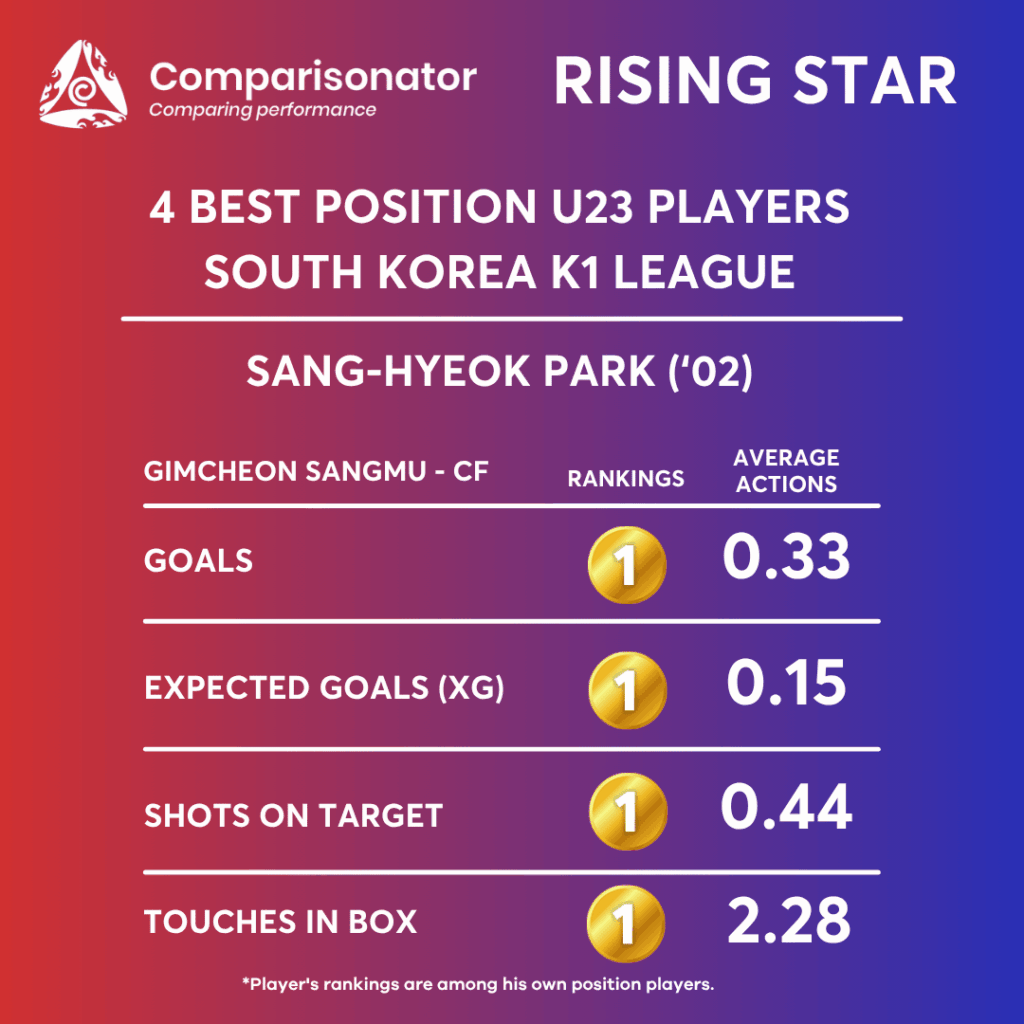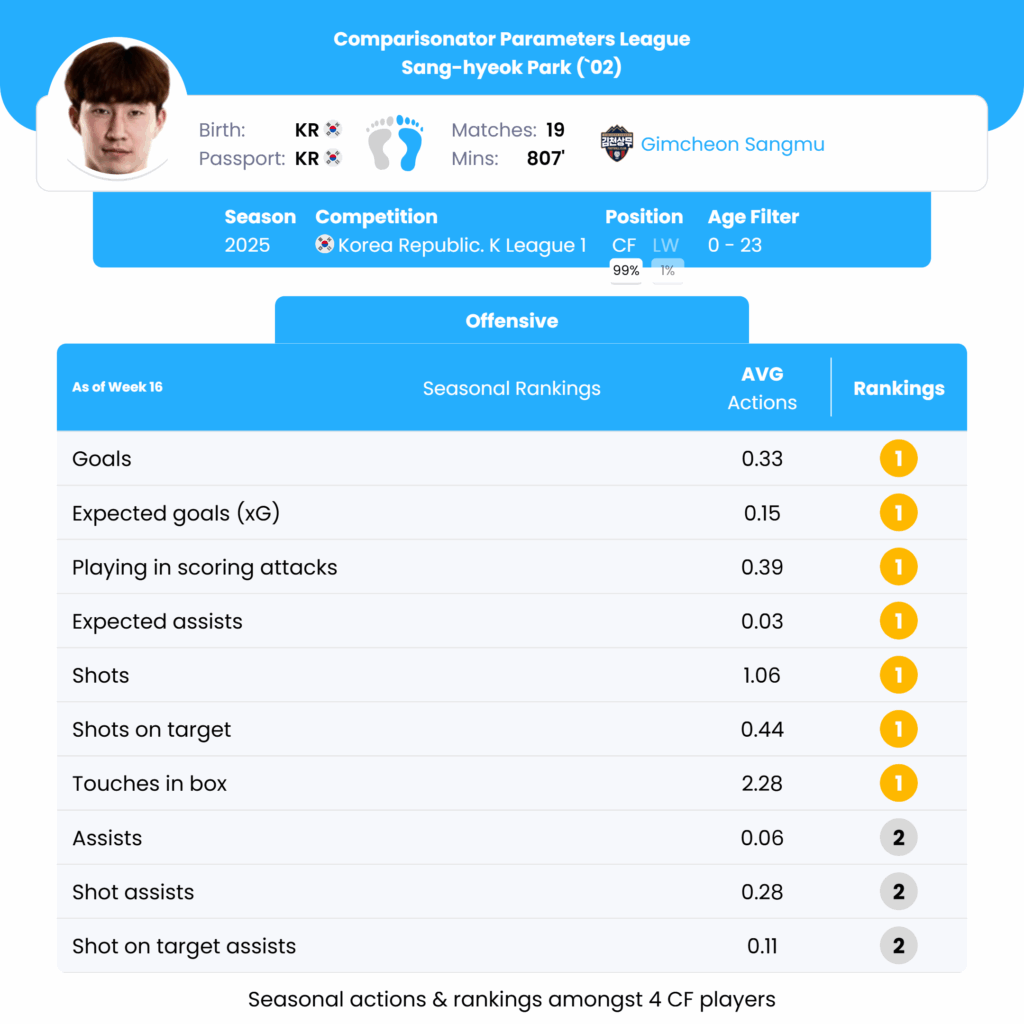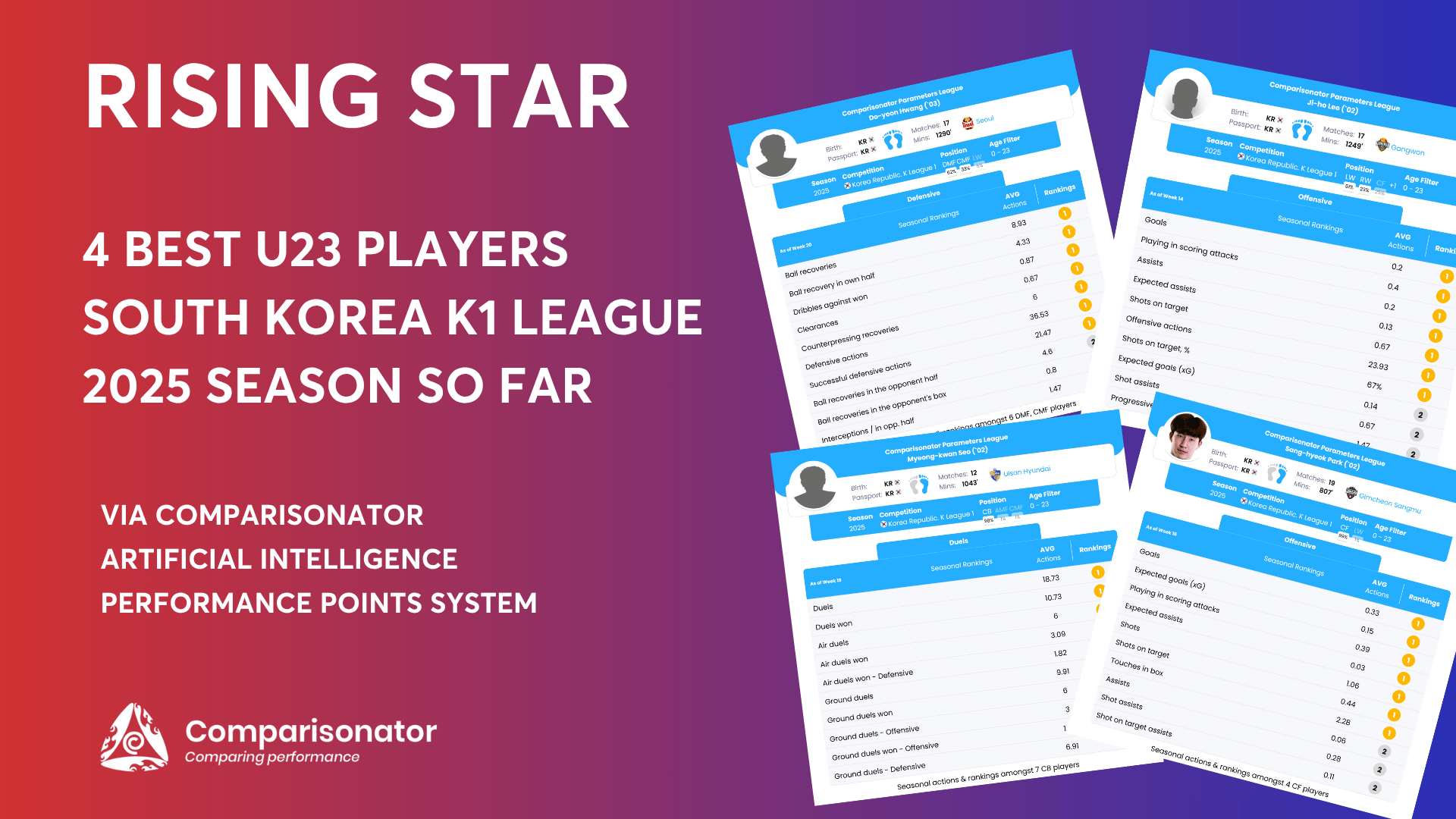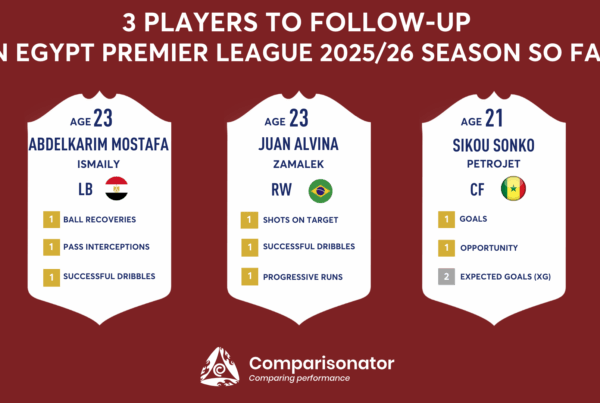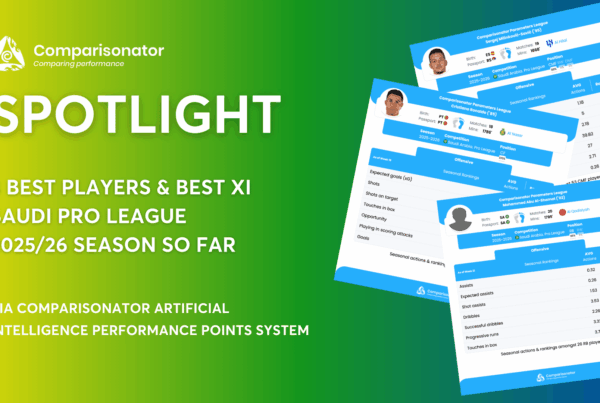As the 2025 South Korea K1 League season unfolds, a new wave of young talents is making a name for themselves across the league. From commanding defenders to dynamic forwards, these players are proving their worth with standout performances and impressive data-driven contributions. Using advanced performance metrics, we break down their impact, strengths, and potential, giving a data-driven perspective on why these rising stars are ones to watch. Let’s dive into the numbers and uncover what makes them stand out in South Korea K1 League.
Powered by CompaGPT, the next-generation AI solution from Comparisonator, this analysis simplifies complex football data into clear, actionable insights. With its cutting-edge features, CompaGPT revolutionizes squad analysis, delivering an instant, in-depth assessment of team performance. In just seconds, it pinpoints standout players, uncovers rising young talents, and identifies key areas for enhancement.
Beyond traditional analysis, CompaGPT offers strategic intelligence to refine transfer strategies. By detecting high-potential signings, it empowers clubs to strengthen key positions and scout future stars with accuracy. With CompaGPT, raw data transforms into valuable, data-driven insights, providing teams with a decisive advantage in the transfer market.
“Rising Star” 4 Best U23 Players South Korea K1 League 2025 Season – So Far
Myeong-Kwan Seo (‘02) (CB) – Ulsan Hyundai
Myeong-Kwan Seo’s CompaGPT Parameters League Duels report:
Seo excels with 10.73 duels won per match, surpassing Park Jin-Young, who averages 8.73. This showcases Seo’s proficiency in winning duels, indicating strong tackling skills and defensive capabilities. His ability to consistently win duels is vital for securing possession and preventing advances from opposing players. Seo ranks first with 6 air duels per match, ahead of Hyeon-yong Lee’s 5.13. Seo’s aerial competence is evident, suggesting excellent timing and physical presence in aerial challenges. This is strategically important for defending set pieces and long balls, where aerial prowess can neutralize threats. Leading with 9.91 ground duels, Seo displays superior engagement on the ground compared to Park Jin-Young’s 8.4. Seo’s involvement in ground duels highlights his agility and readiness to contest possession, providing tactical versatility and resilience against dribbling opponents.
Myeong-kwan Seo’s strengths are evident in his commanding presence in both air and ground duels, particularly in defensive scenarios. His ability to engage and win duels consistently is a testament to his defensive prowess and tactical importance on the field. While he exhibits strong performance metrics, focusing on enhancing his offensive aerial duels, pressing tactics, and duel success rate could further augment his overall contribution and impact in matches.
Myeong-Kwan Seo (‘02) (CB) – Ulsan Hyundai
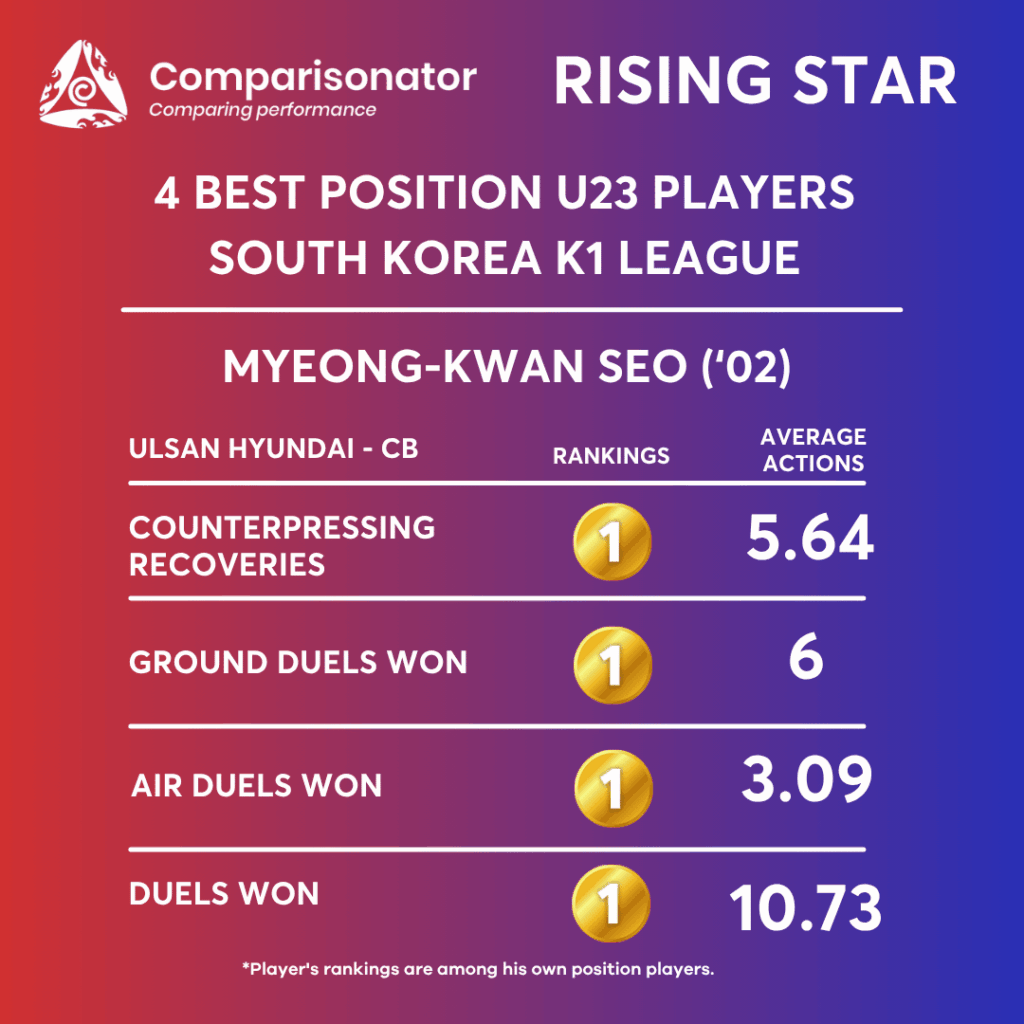
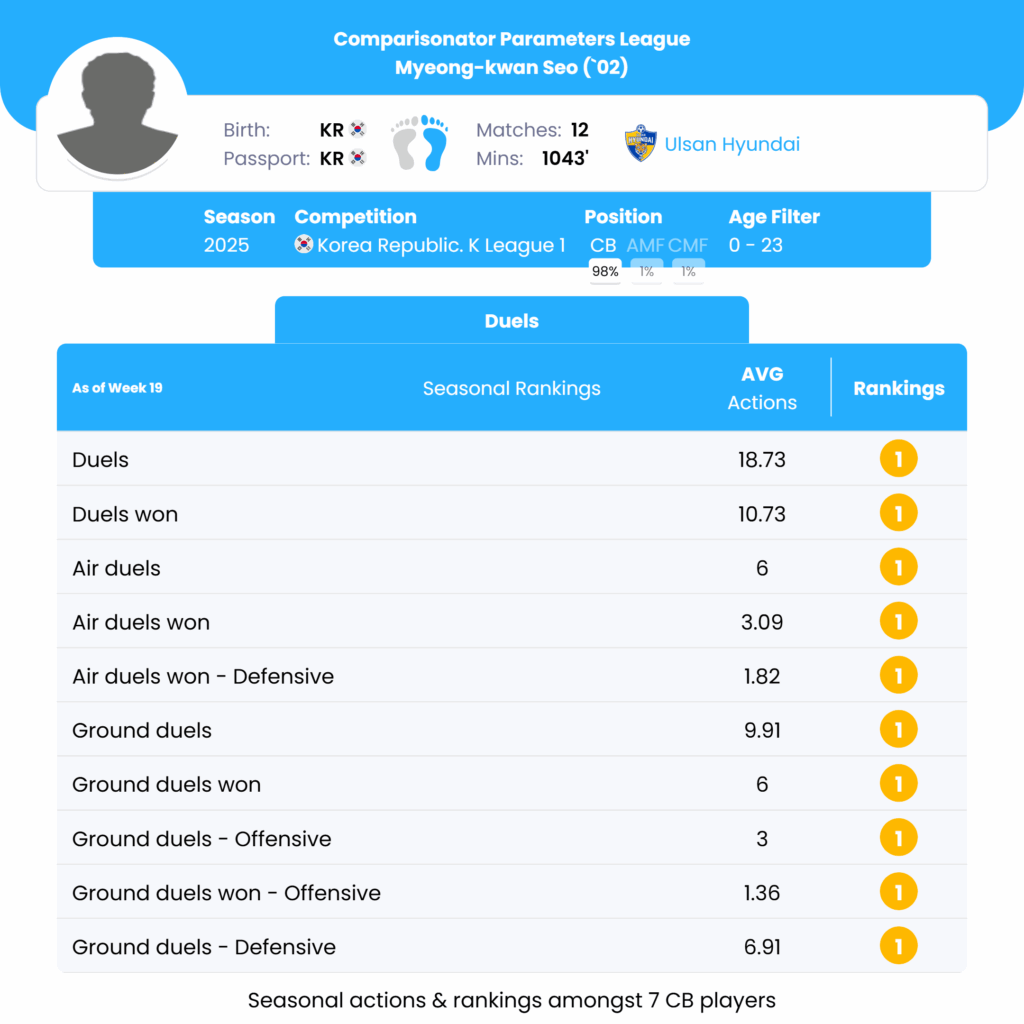
Do-Yoon Hwang (‘03) (DMF) – FC Seoul
Do-Yoon Hwang’s CompaGPT Parameters League Defensive report:
Do-yoon Hwang leads the league in ball recoveries with an average of 8.93 per match, surpassing the next best, Kim Dong-Jin, at 8.43. This indicates Hwang’s proficiency in regaining possession, a critical skill for disrupting opposition play and initiating counter-attacks. His ability to recover the ball effectively can be strategically utilized to maintain team pressure and transition quickly from defense to attack. With an impressive average of 6 counterpressing recoveries per match, Hwang is a leader in this category, outstripping Kim Dong-Jin’s 4.43. This showcases his capability to regain possession quickly after losing it, underlining his role in maintaining high-pressure tactics. His proficiency in counterpressing can be leveraged to disrupt opponent build-up play and sustain offensive momentum.
Do-yoon Hwang’s seasonal performance showcases significant strengths in ball recoveries, counterpressing, and defensive actions, positioning him as a key defensive player. However, his tendency for ball losses, particularly in his own half, presents tactical challenges. Focusing on improving possession retention and defensive positioning might further enhance his overall impact on the pitch. His top-ranking defensive abilities suggest he can be effectively utilized as a central figure in midfield to disrupt opposition play and maintain team pressure.
Do-Yoon Hwang (‘03) (DMF) – FC Seoul
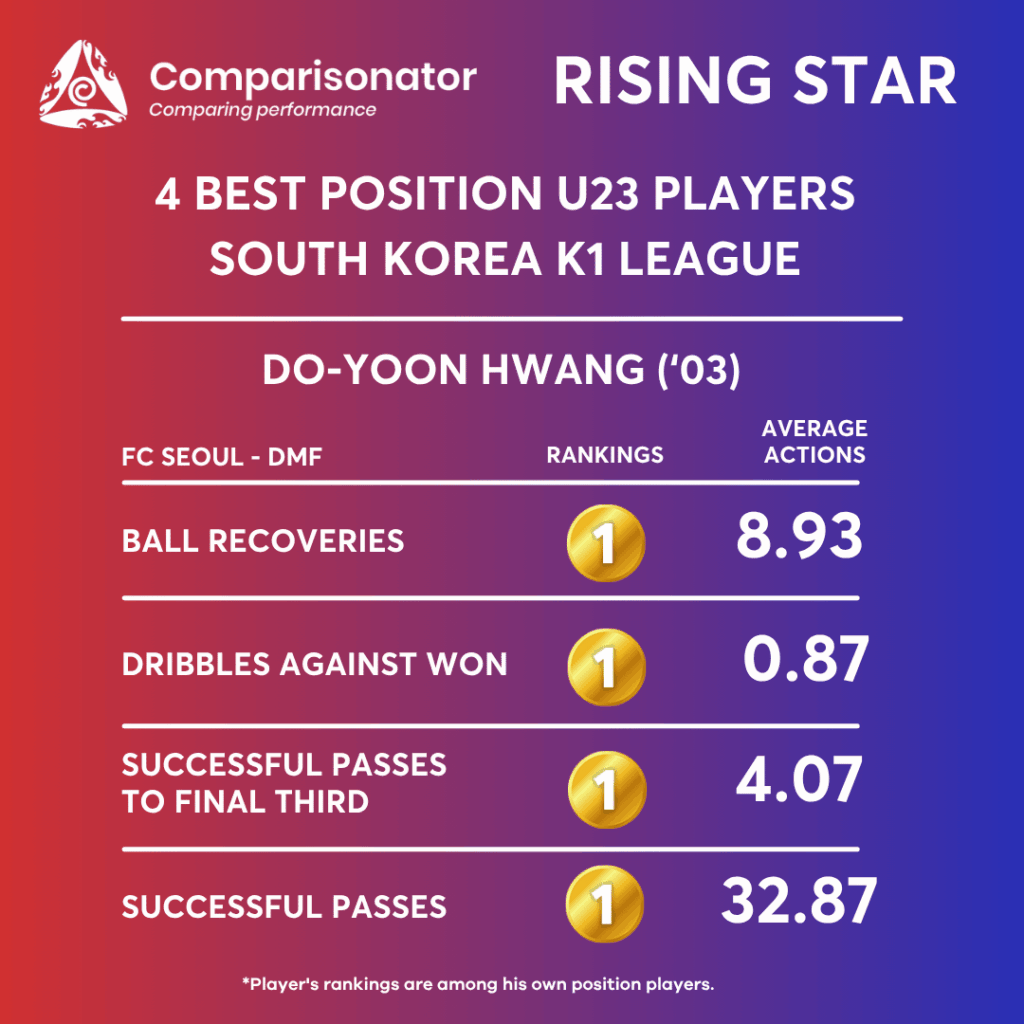
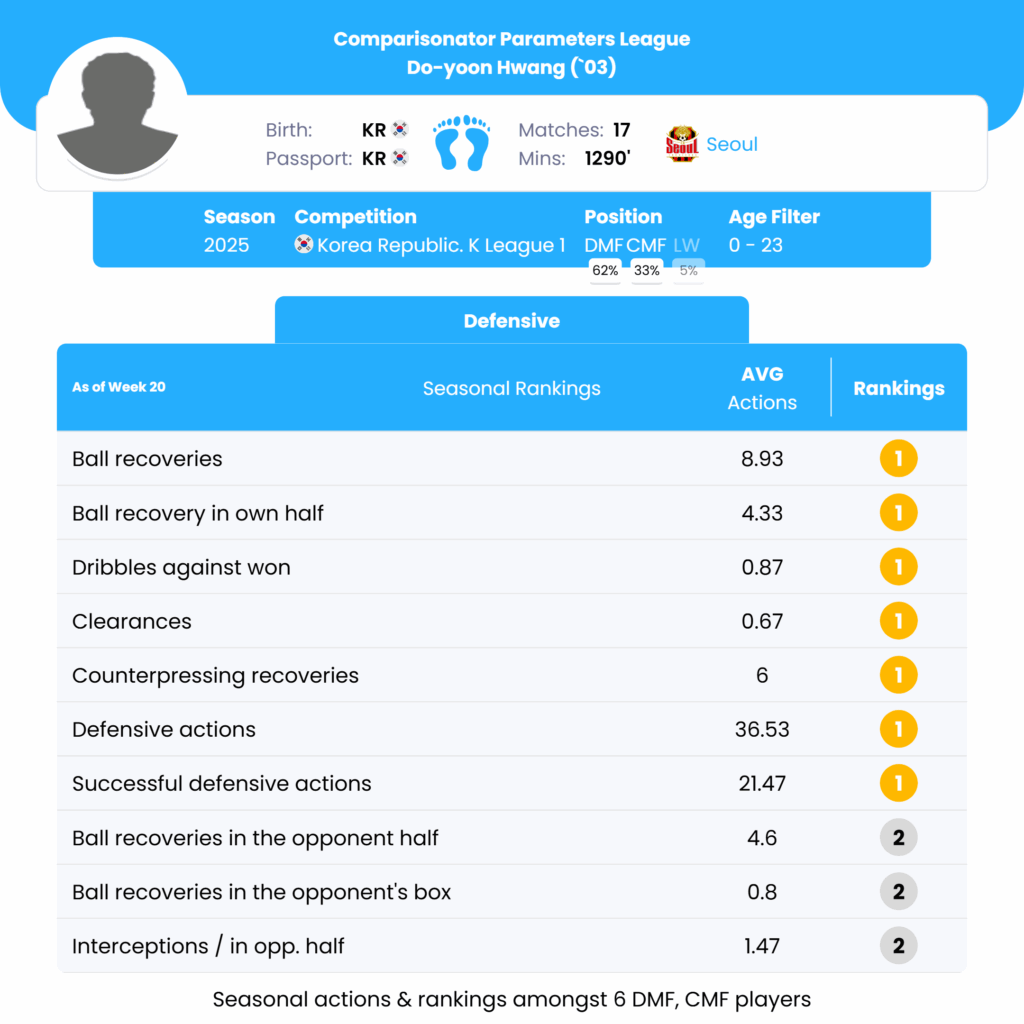
Ji-Ho Lee (‘02) (RW) – Gangwon
Ji-Ho Lee’s CompaGPT Parameters League Offensive report:
Ji-ho Lee leads his position group with an average of 0.2 goals per match, outpacing other players such as J. Kim, who averages 0.11 goals per match. This indicates Ji-ho Lee’s proficiency in finding scoring opportunities and executing them effectively. His goal-scoring ability can be tactically significant, potentially making him a primary scoring threat in offensive strategies. Ji-ho Lee also ranks first in playing in scoring attacks, averaging 0.4 per match. This suggests his active involvement in build-up plays leading to goal-scoring situations, surpassing Hyun-woo Chae’s 0.36. This attribute implies that Ji-ho Lee might be crucial in orchestrating offensive plays, highlighting his vision and tactical awareness. Ji-ho Lee exhibits an impressive 66.67% shots on target, leading his peers in accuracy, compared to J. Kim’s 38.46%. This precision indicates that Ji-ho Lee might be effective in positions where shot-taking opportunities are frequent, optimizing goal-scoring chances.
Ji-ho Lee’s best-ranking parameters include goals scored, participation in scoring attacks, assists, shots on target percentage, and overall offensive actions. These strengths suggest a player with significant offensive potential, capable of influencing game dynamics through both direct goal-scoring and playmaking abilities. Addressing identified weaknesses such as goal conversion and dribbling could further enhance his offensive contributions.
Ji-Ho Lee (‘02) (RW) – Gangwon
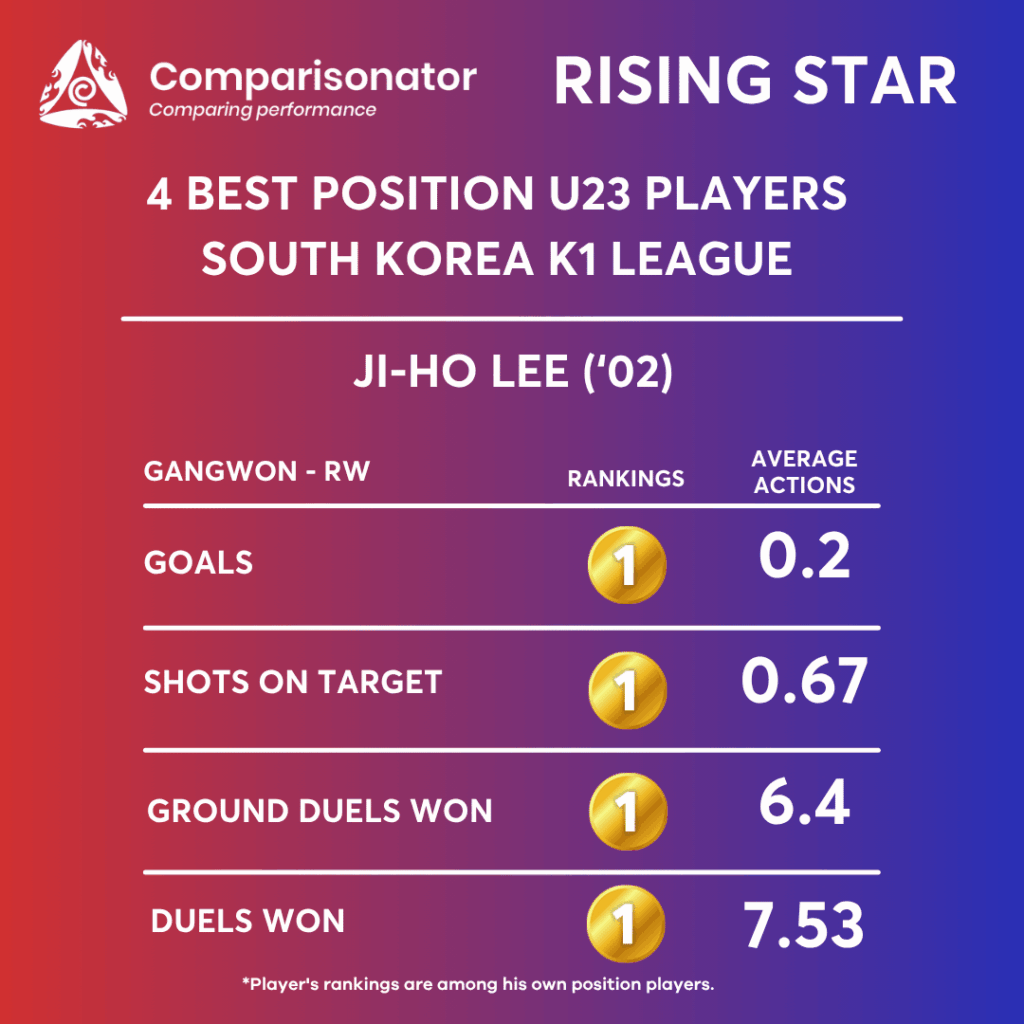
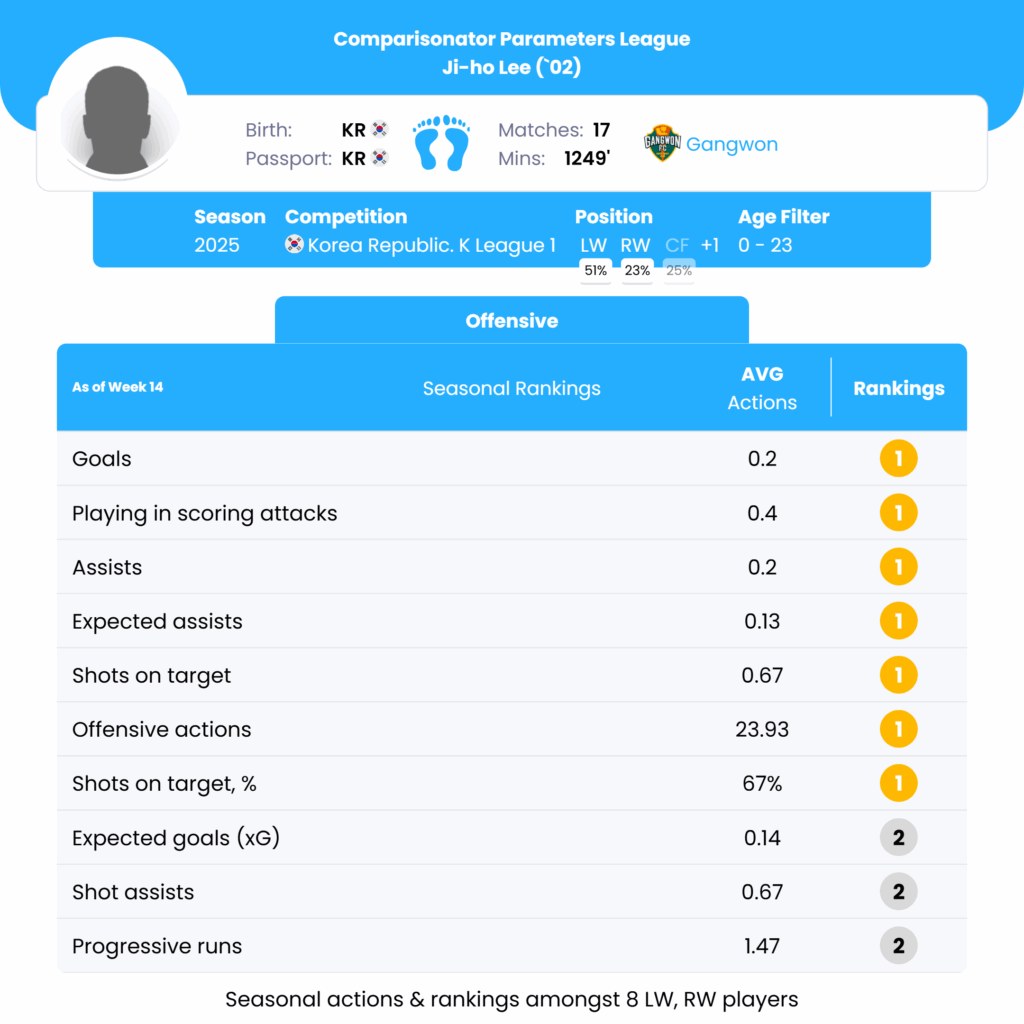
Sang-Hyeok Park (‘02) (CF) – Gimcheon Sangmu
Sang-Hyeok Park’s CompaGPT Parameters League Offensive report:
Sang-hyeok Park ranks first among his peers with a goals average of 0.33 per match, surpassing Sang-hyeok Cho’s 0.08. He also leads with an expected goals average of 0.15, ahead of Jeong Jae-Sang’s 0.12. This suggests Park’s strong ability to position himself in scoring opportunities and convert chances effectively. His proficiency in finding the net can be tactically significant for Gimcheon Sangmu, providing a reliable goal-scoring presence. Leading with 1.06 shots per match and 0.44 shots on target, Park showcases his willingness to take attempts at goal, which is vital for maintaining offensive momentum. Compared to Jeong Jae-Sang, who averages 0.92 shots, Park’s higher frequency of shooting reflects his aggressive attacking mindset, beneficial for consistently challenging opponents. Park excels in playing a role in scoring attacks, with an average of 0.39 per match, outperforming Sang-hyeok Cho’s 0.15. This indicates his involvement in key attacking plays, which can be crucial for creating pressure and generating scoring opportunities for his team. His active participation in these plays enhances his value as a dynamic forward.
Sang-hyeok Park’s standout performance in goal-scoring, involvement in scoring attacks, and ability to position himself in the box underline his offensive strengths. His ranking first in goals, expected goals, playing in scoring attacks, shots, and touches in the box demonstrates his impactful presence in Gimcheon Sangmu’s attacking strategy. These attributes contribute significantly to the team’s offensive dynamics, offering a reliable and tactically influential forward option.
Sang-Hyeok Park (‘02) (CF) – Gimcheon Sangmu
